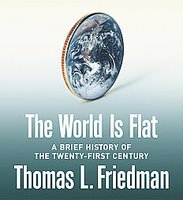Trailing the World
Mayor Daley suggested Thursday that high school be extended for a fifth year to defray college education costs now squeezing working poor and middle-class families.
Unless something is done to loosen the college tuition collar, Daley warned that the “birth rate will go down in the United States and our knowledge-based economy will not grow.”...
“America had better come to grips with this….If we’re a land of opportunity and we want to be a knowledge-based society and we want to compete against India and China, we had better educate our children. These young kids should not be worried about financial assistance — all worried in the [senior] year. Every principal will tell you that. They’re in their offices trying to figure out, ‘Can I get $500? Can I get $1,000, $1,500?’ We have to set our priorities and our priorities should be giving everyone an opportunity to go to college….I hope in 2008 there is a huge national debate on that issue alone.”
While I may have some other differences with the Mayor, I totally respect his passion about this subject. When he came down to Springfield last year, he met with Democratic legislators. The first, and primary, issue that he discussed was this one.
During his talk, he cited Thomas Friedman's must-read book The World is Flat and the concern that we are well down the road to being at a serious competitive disadvantage with foreign countries, whose educational systems and work ethic are outpacing ours.
 Having just returned from Taiwan and having witnessed some of the accomplishments that they are making, I am even more concerned than I was a week ago. I hope to relate some of those observations here soon.
Having just returned from Taiwan and having witnessed some of the accomplishments that they are making, I am even more concerned than I was a week ago. I hope to relate some of those observations here soon.With respect to our local education, I am concerned that we are on the path to a crisis. The answer is not to lower standards and increase the time to take tests so that more kids score 'higher'. The answer is not to consider an increase in minimum wage service jobs to be a sign of economic prosperity.
The answer is to demand more of our education system and to realize that the needed changes will not likely yield results in convenient two or four year cycles that coincide with elections, but will require a willingness and the courage to take bold steps in order to accomplish long-term benefits for our future.
The answer is to prepare our youth to compete in a new world economy. To teach them not just proficiency in their own language, but in other languages as well that will make them desirable in a global environment. One step toward that answer may lay in year-round schooling that would provide societal benefits on many levels. I would be interested in hearing what readers think might be other parts of the equation.
